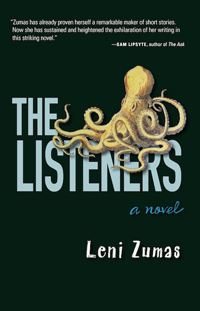Daniel Bailey on ‘The New Sincerity/Alt-Lit’
For those interested (and for those who haven’t already read it), Daniel Bailey has written a tiny bit of a response to the recent discussion of The New Sincerity/Alt-Lit at his Tumblr thingy. You can read Part 1 and Part 2 if you’d like.
Excerpt below from Part 2:
I think Alt Lit is mostly posturing. It’s attaching one’s self to something larger and riding along. Alt Lit is a great white shark and the myriad Alt Lit writers are remoras along for the ride. The only thing is that Alt Lit is not yet a large great white shark. It’s still small. Aside from Tao Lin, who predates Alt Lit and, imho is not Alt Lit because he has his own vision, and Steve Roggenbuck, no Alt Lit writer has created anything that will last beyond Alt Lit’s moment. The shark is not big enough to carry the weight of so many remoras. Steve Roggenbuck, at this point, IS Alt Lit. All others are simply followers. Steve Roggenbuck is to Alt Lit as Nirvana was to grunge.
Interview With Leni Zumas (The Listeners)
Leni Zumas is the author of the story collection Farewell Navigator (Open City) and the novel The Listeners, recently out from Tin House in 2012. Her fiction has appeared in Quarterly West, Open City, Salt Hill, New Orleans Review, New York Tyrant, Columbia: A Journal of Literature and Art, and other magazines. She is an assistant professor in the MFA Program in Creative Writing at Portland State University.
Tin House says of her new novel: “Leni Zumas portrays a world twisted on its axis by loss, in all its grotesque beauty. From the first line the prose is glorious: pricklingly honest and hallucinatory, a lucid dream world realized. The Listeners marks the debut of a major American writer.”
Check out the haunting book trailer by artist Luca Dipierro.
This interview was conducted through email.
***
Genevieve Hudson: The Listeners is filled with examples of renaming, not naming, and unusual descriptions. One example that comes to mind is a boy you describe as “a calamity-haired baby spark.” Do you think of ways to defamiliarize as you write? How does it play a part in your process?
Leni Zumas: My debt to Viktor Shklovsky is huge. Reading his essay “Art as Technique” years ago broke wide open, for me, the idea of strangeness in fiction. In Shklovsky’s view, “estrangement” is crucial to sensation: the reader must experience something as slightly off-kilter, off-expectation, in order to see/hear/feel it as if for the first time (and thereby to be moved by it). The things we’ve already seen—or believe we already know—lose their ability to move us. So as I wrote The Listeners, I was always trying to avoid terms so familiar they’ve grown dead, or at least deadening.
The Listeners
 The Listeners
The Listeners
by Leni Zumas
Tin House, May 2012
352 pages / $12.95 Buy from Tin House, Amazon
When loss is central to a novel, its author faces the unique peril of either fixing the loss—after which there is not much of a story—or dilating it, foregrounding it, and even praising it so that it becomes habitable for a reader. The absence has to be wildly present if it is to be effectual, and the character experiencing it has to be enjoyable enough for a reader to stay with her as she grieves, reassembles herself, or falls abyssward. Leni Zumas’s The Listeners is a novel whose narrator, a thirtysomething bookstore manager and former singer named Quinn, orbits around the loss of her younger sister. Zumas’s effort to preserve that loss is stunningly successful. She reveals Quinn to us in circling episodes, deftly holding the character in the form of a smear of selfhood who doesn’t want to be entire.
The condition of completeness is impossible in Quinn’s world. Since her sister’s death decades ago, she’s been only part-person, and ghost-heavy as the story she gives us. A damaging spectacle of protracted grief, Quinn’s narrative is open enough to let us see her vulnerability and temporally broken enough to get us to believe that her words belong to time itself, which doesn’t care about chronology. There are moments when Quinn acknowledges in interior monologue that she isn’t whole or capable of experiencing herself wholly. For example, in an early scene in which she and her brother Riley are walking to their parents’ house for dinner, she says, “As usual I imagined the destinations of strangers to be firmer than my own. They all had real places to be, where real things happened.” But it’s mostly the angularity of Quinn’s narrative that establishes her fragmented nature. Restless, it drags us back and forth between three periods in Quinn’s life. The first of these is Quinn’s childhood, the era when she loses her sister to a freak bullet. In the second era, as a young woman, Quinn is mostly on the road with her band. The third era, the present, is incomplete, tumescent as it is with pasts.
June 29th, 2012 / 12:00 pm
Shane Jones’s Daniel Fights A Hurricane: The Trailer
DANIEL FIGHTS A HURRICANE [Official Book Trailer] from Ellen Frances on Vimeo.
Now available for preorder.
My History with The New York Times
 I first remember perceiving the term “The New York Times,” sometime in the mid-nineties, living in Granger, Indiana. My parents, a Jew and a soon-to-be-converted Jew, who had spent their entire lives (thirty-something years) on the East Coast, were beginning to feel the cultural ache that came along with Midwestern life. They subscribed to the Sunday edition in order to reconnect with their intellectual elitist roots—a form of journalism invested in the liberal ideology, the arts and sciences of a better tomorrow, which actually did seem possible during the long reign of Clinton’s social wealth. My sister and I bought silly putty and warped the faces of Calvin and Hobbes, of politicians and Paul O’Neill. About a year later my parents cancelled the subscription for reasons I can’t quite recall. Maybe it was because of the money (at that point they didn’t make a lot), maybe it was because they realized they were so isolated, one thousand miles from the local and penetrating stories that carried no immediacy or urgent weight. Or maybe it was because they thought the news was not what it once was. They’ve said this before about 60 Minutes as the past two decades have rolled by, growing more and more nostalgic for something that may never have even been there.
I first remember perceiving the term “The New York Times,” sometime in the mid-nineties, living in Granger, Indiana. My parents, a Jew and a soon-to-be-converted Jew, who had spent their entire lives (thirty-something years) on the East Coast, were beginning to feel the cultural ache that came along with Midwestern life. They subscribed to the Sunday edition in order to reconnect with their intellectual elitist roots—a form of journalism invested in the liberal ideology, the arts and sciences of a better tomorrow, which actually did seem possible during the long reign of Clinton’s social wealth. My sister and I bought silly putty and warped the faces of Calvin and Hobbes, of politicians and Paul O’Neill. About a year later my parents cancelled the subscription for reasons I can’t quite recall. Maybe it was because of the money (at that point they didn’t make a lot), maybe it was because they realized they were so isolated, one thousand miles from the local and penetrating stories that carried no immediacy or urgent weight. Or maybe it was because they thought the news was not what it once was. They’ve said this before about 60 Minutes as the past two decades have rolled by, growing more and more nostalgic for something that may never have even been there.
The company writes a novel per year

The ancient art of the annual report. A book written to ensure investors that their money is safe, that work is being done, profits cleared, America marches forward to the beating of motion of the Invisible Hand of capital. Whether you’re a non-profit, a .EDU, a religious organization, or a major bank, everything is smooth and calm between these pages baby. It’a all less relevant now of course – investors need daily information, not yearly. But there is still something very nice about the idea of an annual report. The plot is always the same, the characters are mild, their decreasing quality of life is the small repetitive tragedy. These are the stories that organizations want to believe about themselves. I believe them.
June 28th, 2012 / 11:43 am

